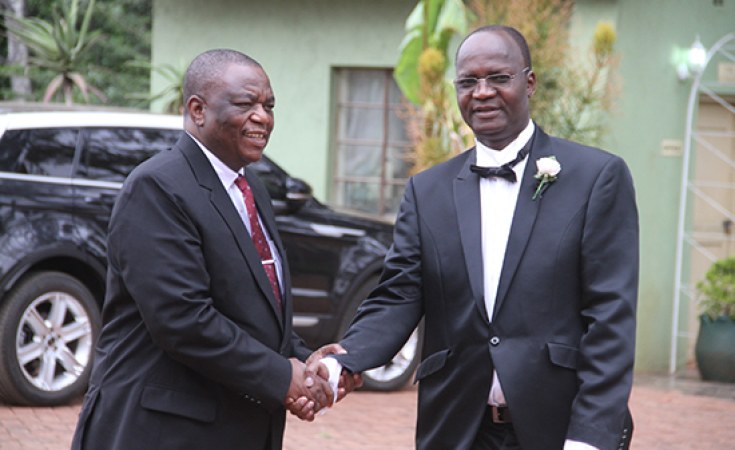Zimbabwe's Vice-President Constantino Chiwenga, a former army general who led the 2017 coup that ousted long-time leader Robert Mugabe, has accused his exiled political rival Professor Jonathan Moyo of treasonous activities for allegedly writing a secret document proposing sweeping political reforms - including the postponement of the 2028 elections to 2035.
The accusations come on the eve of the ruling Zanu-PF's annual conference in Mutare, set to run from 13–18 October, amid an intensifying succession struggle between President Emmerson Mnangagwa and Chiwenga - a contest that could further destabilise Zimbabwe politically and economically, with ripple effects across the region.
Leaked Document at the Heart of the Storm
According to a confidential document presented to Mnangagwa and the Zanu-PF presidium - the party's top five leadership - as well as the Politburo on 17 September in Harare, Chiwenga accuses Moyo of penning a proposal titled "Breaking Barriers Initiative: Putting Zimbabwe First."
Chiwenga claims the document, prepared under the auspices of Parliament, seeks to alter the country's governance system and delay elections until 2035.
The document, seen by The NewsHawks, states its objective as:
"To identify and break chronic toxic barriers to efficient and effective service delivery, infrastructural development and socio-economic progress in Zimbabwe, primarily caused by the scourge of perennially disputed elections and the resultant toxic governance environment."
In his submission to the Zanu-PF leadership - including Vice-President Kembo Mohadi, party chairperson Oppah Muchinguri-Kashiri, and former secretary-general Obert Mpofu - Chiwenga reportedly said:
"Comrade President, you recall I brought to your attention the treasonous project penned by Jonathan Moyo for Parliament to implement - the so-called Breaking Barriers Initiative, which seeks to change our political system and suspend elections to 2035.
Not only is this project treasonous and a huge scandal being championed by people like Moyo, whom we fired from the Party, but it has also never been discussed or approved by Congress or the Central Committee."
Chiwenga went further, accusing prominent businessmen Kudakwashe Tagwirei, Wicknell Chivayo, Scott Sakupwanya, and Delish Nguwaya of funding and facilitating the initiative using funds allegedly looted from public coffers.
He called for their immediate arrest and prosecution, accusing them of using state resources to bankroll political ambitions.
Chiwenga's accusations add a volatile new dimension to Zanu-PF's ongoing internal tensions ahead of the Mutare conference, which is expected to signal the direction of the party's succession politics and Mnangagwa's future beyond 2028.
Although Mnangagwa has publicly declared himself a "constitutionalist" who will not seek to extend his term, his allies are reportedly pushing for a resolution allowing him to stay in power beyond the constitutional two-term limit.
The upcoming conference is expected to ratify the Bulawayo resolution of 2023, which called for Mnangagwa's continued rule - a move strongly opposed by Chiwenga and his faction.
The renewed hostility between Chiwenga and Moyo revives a long-running feud between two men whose relationship has oscillated between alliance and enmity for over a decade.
Before the November 2017 coup, the pair briefly cooperated politically but later fell out over how to manage Mugabe's exit. Moyo, aligned with the G40 faction loyal to Mugabe and his wife Grace, favoured a negotiated transition, while Chiwenga, then allied with Mnangagwa's Lacoste faction, opted for military intervention.
When Chiwenga's troops staged the coup, Moyo was among those targeted. Soldiers reportedly attacked his Greystone Park home with explosives, but Moyo and his family managed to flee to Saviour Kasukuwere's residence and later escaped to Mozambique, before settling in exile in Nairobi, Kenya.
Since then, Moyo has been a vocal critic of both Mnangagwa and Chiwenga, although he has recently toned down his rhetoric. Chiwenga, however, has maintained deep mistrust of Moyo, once suing him for US$5 million in 2018 over allegations related to his PhD from the University of KwaZulu-Natal - a case later settled out of court.
Analysts warn that the escalating Mnangagwa–Chiwenga power struggle could reignite instability in Zimbabwe, risking economic deterioration and triggering further migration into neighbouring countries, particularly South Africa, which already hosts millions of Zimbabweans.
The dispute also places renewed pressure on regional bodies like SADC and the African Union, which have struggled to mediate Zimbabwe's protracted political crises for decades.
With the Mutare conference opening tomorrow, all eyes will be on how Zanu-PF handles the explosive allegations - and whether Chiwenga's treason charge against Moyo deepens the party's internal fissures or marks the beginning of a larger political showdown within the ruling establishment.
- online
 OK Zimbabwe posts US$17,8 million loss
OK Zimbabwe posts US$17,8 million loss  Hichilema meets Chivayo
Hichilema meets Chivayo  Millions celebrate Diwali festival in India
Millions celebrate Diwali festival in India  Econet Zimbabwe to delist from ZSE
Econet Zimbabwe to delist from ZSE  Gold edges up as traders await guidance
Gold edges up as traders await guidance  Mnangagwa fires Chitando, appoints Polite Kambamura
Mnangagwa fires Chitando, appoints Polite Kambamura  Young Investment Professional (YIP) Graduate Programme 2019
Young Investment Professional (YIP) Graduate Programme 2019 











 Young Investment Professional (YIP) Graduate Programme 2019
Young Investment Professional (YIP) Graduate Programme 2019
Editor's Pick